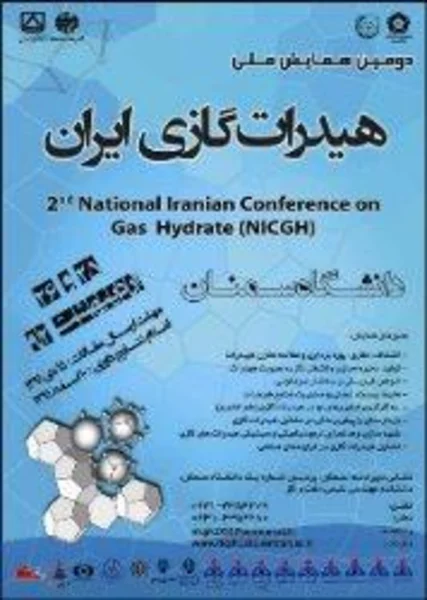-
experimental study and modeling of methane hydrate formation induction time in the presence of ionic liquids
جزئیات بیشتر مقاله- تاریخ ارائه: 1391/01/01
- تاریخ انتشار در تی پی بین: 1391/01/01
- تعداد بازدید: 703
- تعداد پرسش و پاسخ ها: 0
- شماره تماس دبیرخانه رویداد: -
gas hydrate formation has been referred as unfavorable phenomenon since it leads to blockage of pipelines. to prevent formation of these compounds, several methods are normally pursued including system heating, depressurization, water removal, and use of gas hydrate formation inhibitors. the latter technique may be the most practical method for this purpose. two types of inhibitors are generally used in the industry: thermodynamic inhibitors and kinetic ones. thermodynamic inhibitors (such as ethylene glycol and methanol) shift the hydrate-liquid-vapor- (hlv) equilibrium curve to lower temperature and higher-pressure conditions. kinetic inhibitors (such as pvp, pvcap) delay the hydrate nucleation and growth rates. there are some evidences that ionic liquids have dual inhibition effects. in this communication, we use three ionic liquids including (bmim-bf4), (bmim-dca), and (teacl). methane hydrate formation induction time in the presence of different concentrations of these three ionic liquids is kinetically investigated in this work. consequently, the effects of initial pressure and ionic liquids concentration on the induction time can be evaluated. in addition, a three parameter semi-empirical model is developed on the basis of chemical kinetics theory. finally, it is shown that the proposed semi-empirical model has a good accuracy in comparison with the experimental data.
مقالات جدیدترین رویدادها
-
استفاده از تحلیل اهمیت-عملکرد در ارائه الگوی مدیریت خلاقیت سازمانی و ارائه راهکار جهت بهبود
-
بررسی تاثیر ارزش وجوه نقد مازاد بر ساختار سرمایه شرکت های پذیرفته شده در بورس اوراق بهادار تهران
-
بررسی تأثیر سطح افشای ریسک بر قرارداد بدهی شرکت های پذیرفته شده در بورس اوراق بهادار تهران
-
بررسی تأثیر رتبه بندی اعتباری مبتنی بر مدل امتیاز بازار نوظهور بر نقد شوندگی سهام با تأکید بر خصوصی سازی شرکت ها
-
تأثیر آمیخته بازاریابی پوشاک ایرانی بر تصویر ذهنی مشتری پوشاک ایرانی (هاکوپیان)
-
مبانی طراحی و بهینه سازی حوضچه آرامش تیپ 3 مطالعه موردی: بند انحرافی باغ وزیر صوفیان
-
تحلیل اندرکنش دینامیکی سد و مخزن با استفاده از روش اجزاء محدود طیفی
-
a new constitutive model for prediction of saturated sand behavior using artificial neural network
-
food security of the elderly in iran during the covid 19 pandemic
-
nonlinear finite element analysis of cft-to-bracing connections subjected to axial compressive forces
مقالات جدیدترین ژورنال ها
-
مدیریت و بررسی افسردگی دانش آموزان دختر مقطع متوسطه دوم در دروان کرونا در شهرستان دزفول
-
مدیریت و بررسی خرد سیاسی در اندیشه ی فردوسی در ادب ایران
-
واکاوی و مدیریت توصیفی قلمدان(جاکلیدی)ضریح در موزه آستان قدس رضوی
-
بررسی تاثیر خلاقیت، دانش و انگیزه کارکنان بر پیشنهادات نوآورانه کارکنان ( مورد مطالعه: هتل های 3 و 4 ستاره استان کرمان)
-
بررسی تاثیر کیفیت سیستم های اطلاعاتی بر تصمیم گیری موفق در شرکتهای تولیدی استان اصفهان (مورد مطالعه: مدیران شرکتهای تولیدی استان اصفهان)
-
استخراج ویژگی در تشخیص هویت از روی عنبیه با استفاده از الگوریتم ژنتیک و شبکه عصبی مصنوعی
-
بررسی رابطه سبک های دلبستگی ادراک شده با رشد پس از سانحه و استرس پس از سانحه در دانش آموزان سیل زدگان شهرستان آق قلا
-
بررسی تاثیر سبک رهبری تحول گرا و فرهنگ یادگیری سازمانی بر اجرای برنامه ریزی منابع سازمانی (erp)
-
ارایه الگوهای طراحی پژوهشکده نانو فناوری با رویکرد معماری اکوتک
-
the inspiration of bauhaus principles on the modern housing in cyprus




سوال خود را در مورد این مقاله مطرح نمایید :